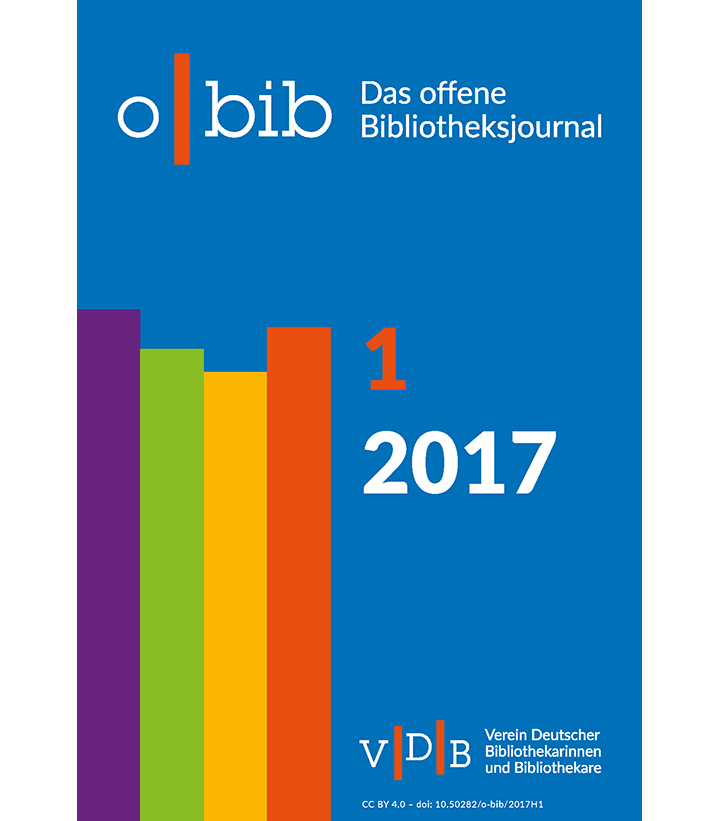Threshold Concepts in deutschen Bibliotheken - eine Utopie?
DOI:
https://doi.org/10.5282/o-bib/2017H1S26-31Schlagwörter:
Informationskompetenz, Teaching Librarian, Information Literacy, Threshold ConceptsAbstract
Dieser Artikel versucht sich an einer Bestandsaufnahme der Situation in der Informationskompetenzvermittlung in Hochschulbibliotheken. Dabei geht es um die veränderten Bedürfnisse von Studierenden sowie deren Informationsverhalten. Das Gerüst der Threshold Concepts der Association of College and Research Libraries (ACRL) wird auf seine Eignung untersucht, einen ganzheitlichen Ansatz des wissenschaftlichen Arbeitens in Zusammenarbeit mit der Hochschule zu erreichen. Konkret: Wie können die Threshold Concepts in deutsche IK-Veranstaltungen integriert werden und wieviel müssen und können Bibliothekare auf diesem Gebiet leisten?
This article tries to capture the current situation in the field of information literacy teaching at German universities. The main points of discussion are the changing needs of students and their approach to information in an academic environment. The paper investigates whether the framework of threshold concepts developed by the Association of College and Research Libraries (ACRL) is suitable for a hollistic approach to academic research and writing in cooperation with universities. So the question is: How can threshold concepts be integrated in the German information literacy conception and to what extent could or should librarians embrace them?
Literaturhinweise
Bravender, Patricia, Hazel McClure und Gayle Schaub, Hrsg. Teaching Information Literacy Threshold Concepts: Lesson Plans for Librarians. Chicago: Association of College and Research Libraries, 2015.
Executive Summary. „Evaluating Information: The Cornerstone of Civic Online Reasoning,“ Stanford History Education Group (2016), https://sheg.stanford.edu/upload/V3LessonPlans/Executive%20Summary%2011.21.16.pdf.
„Framework for Information Literacy for Higher Education’. Association of College & Research Libraries (ACRL), 9. Februar 2015. Zuletzt geprüft am 28.11.2016. http://www.ala.org/acrl/standards/ilframework.
Hanke, Ulrike, und Wilfried Sühl-Strohmenger. Bibliotheksdidaktik: Grundlagen zur Förderung von Informationskompetenz. Bibliotheks- und Informationspraxis 58. Berlin: de Gruyter, 2015.
Hapke-Weblog: About Information Literacy, History, Philosophy, Education and beyond. http://blog.hapke.de/information-literacy/threshold-concepts-statt-standards-zur-informationskompetenz/.
Hapke-Weblog: About Information Literacy, History, Philosophy, Education and beyond. http://blog.hapke.de/information-literacy/was-unter-informationskompetenz-verstanden-wird-veraendert-sich/.
Hofer, Amy R., Lori Townsend, und Korey Brunetti. „Troublesome Concepts and Information Literacy: Investigating Threshold Concepts for IL Instruction.“ Portal: Libraries and the Academy 12, Nr. 4 (2012): 387–405. Zuletzt geprüft am 27.11.2016. https://muse.jhu.edu/article/487361.
Klages, Benjamin, Nino Ferrin, Anja Lull, und Stefan Bestmann. „Neue Medien für neue Studierweisen? Hochschulische Entwicklungsschritte zur Integration zeitgemäßer Kommunikationsformate in Lehre und Studium.“ In Gestaltungsraum Hochschullehre. Potenziale nicht-traditionell Studierender nutzen, herausgegeben von Klages, Benjamin. 267-278. Opladen: Budrich, 2015.
Leichner, Nikolas. „Multimethodale Erfassung von Informationskompetenz Bei Psychologiestudierenden.“ Zuletzt geprüft am 12.10.2016. http://ubt.opus.hbz-nrw.de/volltexte/2015/934/.
Meyer-Doerpinghaus, Ulrich, und Inka Tappenbeck. „Informationskompetenz neu erfinden: Praxis, Perspektiven, Potenziale.“ o-bib 2, Nr. 4 (2015): 182–91. http://dx.doi.org/10.5282/o- bib/2015H4S182-191.
Steiner, Katrin. „Forschungsdatenmanagement Und Informationskompetenz : Neue Entwicklungen in Hochschulbibliotheken Neuseelands.“ Köln: PubLIS TH Köln, 2013. urn:nbn:de:hbz:79pbc- 2014030638.
Siegfried, Doreen und Elisabeth Flieger. ‘World Wide Wissenschaft – Wie Professionell Forschende Im Internet Arbeiten’. ZBW Website. Zuletzt geprüft am 12.11.2016. http://www.zbw.eu/de/ueber-uns/presse/pressemitteilungen/meldung/news/world-wide-wissenschaft-wie-professionell-forschende-im-internet-arbeiten/.
Townsend, Lori, Amy Hofer, Silvia Lin Hanick, und Korey Brunetti. „Identifying Threshold Concepts for Information Literacy: A Delphi Study.“ Communications in Information Literacy 10, Nr. 1 (2016): 23-49. http://www.comminfolit.org/index.php?journal=cil&page=article&op=view&path%5B%5D=v10i1p23&path%5B%5D=228
Wineburg, Sam. „Students Have “Dismaying” Inability To Tell Fake News From Real, Study Finds.“ NPR.org. Zuletzt geprüft am 29.11.2016. http://www.npr.org/sections/thetwo-way/2016/11/23/503129818/study-finds-students-have-dismaying-inability-to-tell-fake-news-from-real.
Wollschläger-Tigges, Martin. „Informationssuchverhalten Als Ansatz Einer Evidenzbasierten Gestaltung von Veranstaltungen Zum Erwerb von Informationskompetenz,“ 2016. https://opus4.kobv.de/opus4-bib-info/files/2373/EvidenzIK.pdf.
Yurt, Murat, und Patrick Simon. „Stand Der Vermittlung von Informationskompetenz an Deutschen Bibliotheken – Eine Exemplarische Untersuchung.“ Information - Wissenschaft & Praxis 35, Nr. 4 (2015): 242–254. http://dx.doi.org/doi:10.1515/iwp-2015-0035.
Veröffentlicht
Ausgabe
Rubrik
Lizenz
Copyright (c) 2017 Carolin Ahnert

Dieses Werk steht unter der Lizenz Creative Commons Namensnennung 4.0 International.





